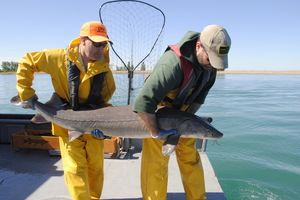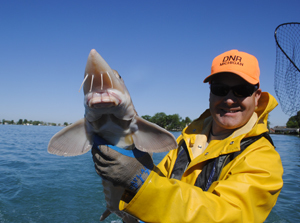|
April 4, 2018
Contact: Ann Feldhauser (Sturgeon for Tomorrow), 906-346-9511 or Ed Golder (DNR), 517-335-3014
Volunteer to help guard Michigan's sturgeon
Effort takes place on the Black River in Presque Isle County
 The Black
Lake Chapter of Sturgeon for Tomorrow in Cheboygan County is seeking volunteers
to join in its effort, in partnership with the Michigan Department of Natural
Resources’ Law Enforcement and Fisheries Divisions, to help protect lake
sturgeon from illegal harvest during the annual spawning run.
Every
spring, mature lake sturgeon, a fish species that is threatened in Michigan and
rare throughout the United States, become vulnerable to poaching as they
briefly leave Black Lake for spawning sites upstream in the Black River.
Hundreds
of volunteers are needed to stand guard along the Black River during the
spawning season, from mid-April through early June, to report any suspicious
activity and deter the unlawful take of this iconic fish.
|
“For over
18 years, the annual Sturgeon Guarding Program has proven that people serving
as sturgeon guards watching over the river have virtually eliminated poaching,
while helping to ensure the protection and reproductive success of the
species,” said Ann Feldhauser, a DNR retiree and the guarding program’s
volunteer coordinator. “It’s a unique and rewarding experience to witness these
majestic fish, which can live up to 100 years and weigh over 200 pounds,
swimming up the Black River and to be a key player in safeguarding one of
Michigan's most valuable natural resources.”
When
spawning begins, sturgeon guards are assigned in shifts to sites along the
river. The volunteers stand watch and, if suspicious activity occurs, use
cellular phones provided by Sturgeon for Tomorrow to contact DNR conservation officers
who are actively patrolling the area in support of the guarding effort. Aerial
surveillance is also deployed to help secure the area.
“The
experience of watching researchers capture, tag and release these amazing fish
is, in itself, worth the effort of becoming involved,” said Brenda Archambo, coordinator
of the Sturgeon Recovery effort in the Black River watershed. “We also
encourage those who enjoy mountain biking, mushrooming, hiking, kayaking,
canoeing and camping in beautiful wild areas to partner with the sturgeon
guarding effort, where the diversity of the experience on the Black River
offers a wonderful experience.”
 Many opportunities over the approximately six-week-long spawning season are available for those who wish to help. Coordinators will be on-site at the river to assist and answer questions. In addition to guarding the sturgeon, volunteers can also play a key role by recording the number and activity of fish they see. This has become a popular activity for families, scouting and church groups, as well as students interested in natural resource management. Often artists participate as well, especially photographers.
Individuals or groups interested in volunteering should contact Mark and Ann Feldhauser at 906-201-2484, or 906-346-9511.
Volunteers can also register online at www.sturgeonfortomorrow.org/guarding-program.php or web search Sturgeon for Tomorrow, Black Lake Chapter.
For those traveling from outside the local area, hotels, restaurants and Onaway State Park (located on Black Lake) which has improved camping and cabin rentals, are close to the guarding locations.
|
Volunteers
are also encouraged to set up their rustic camps along the banks of the Black
River. There is no charge for camping on the state land adjacent to the Black
River.
Lake
sturgeon rehabilitation in the Cheboygan River watershed is a cooperative effort
involving the Black Lake Chapter of Sturgeon for Tomorrow, the Michigan
Department of Natural Resources, Michigan State University and Tower-Kleber
Limited Partnership.
In
addition to the guarding program, this effort includes activities such as tagging
sturgeon adults and raising young fish for stocking in the Black, Burt and
Mullet Lakes, all in Cheboygan County.
/Note to editors:
Accompanying photos are available below for download. Credit Michigan Department of Natural Resources unless otherwise noted. Caption information
follows.
Release: Lake sturgeon are fascinating fish.
Sturgeon: Lake sturgeon are an iconic and ancient fish species./
|